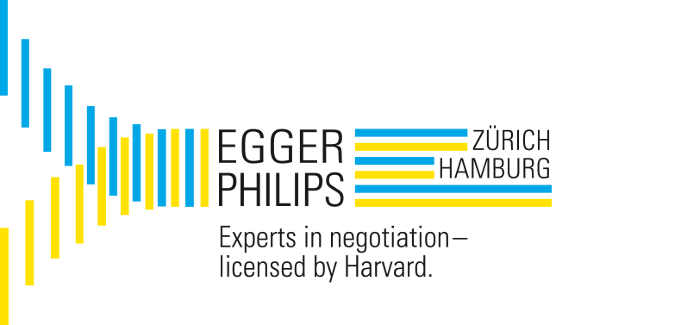1. Professional Behavior
Our training gives the negotiation professional the opportunity to test and improve their performance in a risk-free context, still removed from serious and real cases. Even for sporting champions, regular training is a necessity. Training gives you the chance to experiment in new directions, and with new methods, strategies or tactics. The same applies for negotiation training. A professional prepares thoroughly and engages in a variety of scenarios. Training key abilities is a mark of professionalism.
2. Focus on your Success Factor
During our training sessions participants have the opportunity to work exclusively on negotiation as an ability. Leading managers spend up to 90% of their time and job-role negotiating. Questions of content are normally dominant, however, so that they have little capacity to investigate the negotiation process itself. In our training sessions we deal systematically with that process of negotiating , develop strategies for a variety of different negotiation situations and shed light on demonstrated behavior during negotiations in a critical yet constructive manner.
3. An All-Round Capability-Checkup with the Best
Our training sessions allow participants to work intensively on their strengths and weaknesses in a confidential setting, facilitated by our coaches and trainers. They also provide opportunities for tackling extreme situations in negotiation contexts. Negotiating demands all-round abilities of a kind that hardly anyone possesses, at least not 100%. In our sessions participants can allow themselves to make mistakes, try out new ways of negotiating, and learn from each other. Drawing on the best possible qualifications acquired through the Harvard Negotiation Project (today integrated in the Project on Negotiation PON), certified trainers and coaches with deep practical experience can guarantee that quality and confidentiality.
4. Furthering Entrepreneurial Success
Through our in-house negotiation seminars, participants acquire an instrument which enable them to ensure long-term business success. Our ‘Open negotiation based on the Harvard-Concept®’ is the ideal basis for developing a style of negotiation specific to your company, orientated towards your company’s principles, especially insofar as these are compatible with a win-win philosophy. Working outwards, this negotiation style promises long-term successes, i.e. stable and satisfying cooperation. Working inwards, such a negotiation style helps to establish a form of dialogue in which conflicts of interests are dealt with in an open, efficient and solution-oriented way.
5. Mastery of a Proven Concept
Our negotiation training sessions impart strategies which enable verifiable long-term success. In our age of curtailed resources and increasingly tough struggles around resource allocation, above-average negotiating ability and clear conceptual thinking are in greater demand than ever. Our approach, based on the findings of academic research and tested in the most difficult international negotiation conflicts, gives leading managers more reassurance than any secret recipes, tricks or quick shots, which, at best, can only be successful in the short-term and in individual cases.
6. An Effective and Efficient Leadership Instrument
Our training sessions teach a system of sequential negotiations, steps which provide participants in negotiations – but also expert independent observers – ample material for a reliable evaluation of the negotiation’s results. Every line-manager assumes at least part of the responsibility for the negotiation results of their own staff. After our training, you will be able to quickly and thoroughly construct an all-round picture of what happened during negotiations, even those in which you yourself did not participate. Over and above this, you’ll be able to coach your staff efficiently, helping them both to prepare for, and during, negotiations.
7. Far more than a technique
Our seminars are about much more than just teaching a technique: we go further, working intensively on the question of what this way negotiating means in a deeper sense. For motivations are driven by meaning, and meaning is found not in techniques (know-how) but rather in the questioning of values (know-why). Techniques are only effective long-term when they’re supported by a conviction that they are employed in the service of something meaningful, for yourself and for other people. In our training sessions we work with the participants, exploring the extent to which the win-win principle matches with their own value-systems, and focusing on the value that is created when individuals aim for the larger advantage of all members of a system, rather than their own individual payback. And this is an entirely different way of thinking, one that goes beyond the negotiating table
